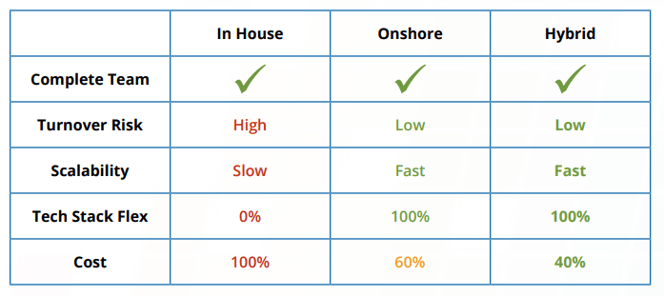Keeping a full staff and operations flowing at any business can be easily effected by a multitude of factors, including economic, environmental and governmental. After a year like 2020, which was molded by a global health crisis, there was and still continues to be a shift in how business gets work done. From layoffs to additional workloads, IT teams in particular are often tasked with doing far more with far less. If your business is struggling with the same issues, hiring a retainer team is an effective way to keep your IT projects on track and quickly clear the IT backlog.
Benefits of Retainer Teams & How the Model Works
A relationship with a retainer team allows your business to tap into a group of skilled and experienced resources instantly. These teams are dedicated to working on your projects as an extension of your current staff and can assimilate quickly. IT retainer teams execute immediate ROI for a significantly lower investment compared to an in-house team. By utilizing these teams, you'll not only eliminate turnover risk, but improve quality with cost-effectiveness.
IT Retainer Team Benefits
- Scalability - While a core team is maintained for continuity, the number of team members can easily be scaled up and down depending on need
- Quality - Team members often come with 10+ years of experience and are extensively trained and certified
- Flexibility - Teams are flexible enough to work under different methodologies and environments, as well as with different technology stacks (i.e. ServiceNow, MuleSoft, mobile/app dev, QA automation, Cloud migration, AI, IoT, RPA, etc.)
- Ease of Engagement - Easily assign tasks just like internal employees/consultants
A Proven Model
In addition to the benefits above, why else would a retainer team be preferable to the convenience of an in-house team? The biggest standout lies in the access to experienced developers. These developers are trusted to take over your IT project. They go through consistent training and certifications, are well-tested for quality of work and work ethic, and have experience working on several projects with firms in similar models, so they know how the process works. According to Towards Data Science, "It makes a difference to bring in outside voices who interact with a wide array of solutions and client requirements." Bringing in a different perspective is, in itself, worth the investment.
Composition of V-Soft Retainer Teams
Combined with experienced and accredited developers, V-Soft Consulting's IT retainer teams include an additional 5 differentiating roles: Onshore Engagement Manager, Technical Project Manager, Architect, Business Analyst and Quality Assurance Tester. This seamless integration and combination of roles help ensure a successful project outcome.
- Onshore Engagement Manager - Oversees risk mitigation, project delivery and overall communications
- Technical Project Manager - Executes reporting, expectation management and process adherence
- Business Analyst - Gathers and documents requirements
- Architect - Provides code review and unit testing
- Quality Assurance Tester - Confirms and ensures outcomes through testing
Most Popular Project Retainers
- ServiceNow
- MuleSoft
- Mobile Development
- Application Development
- QA Automation
- Cloud Migrations
- AI/IoT
- RPA
Onshore Retainer vs Hybrid Retainer
It's important to understand the different retainer team options out there before integrating into your existing team. The Hybrid model, for example, provides the lowest cost investment while maintaining the benefits of low turnover risk, fast and easy scalability, and overall technology stack flexibility.

















